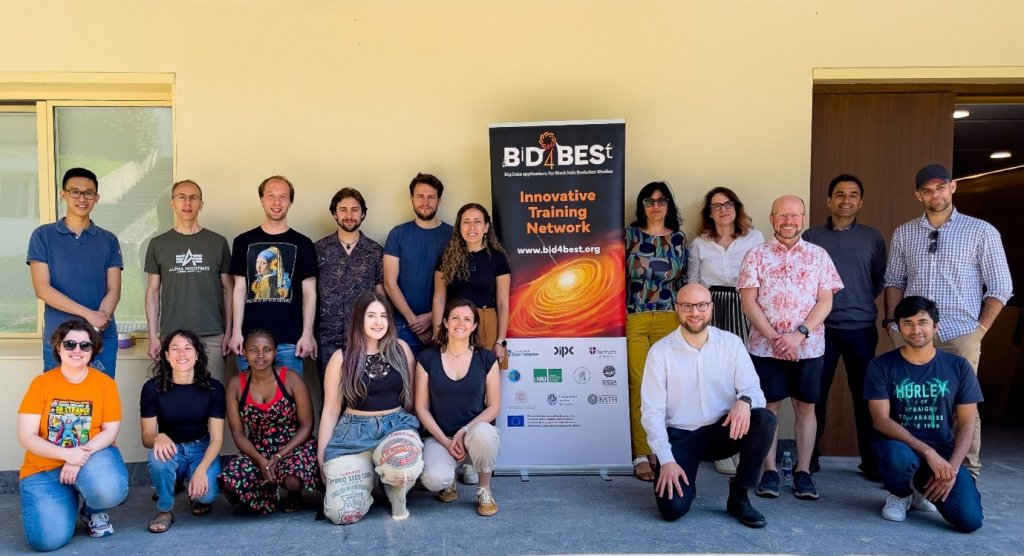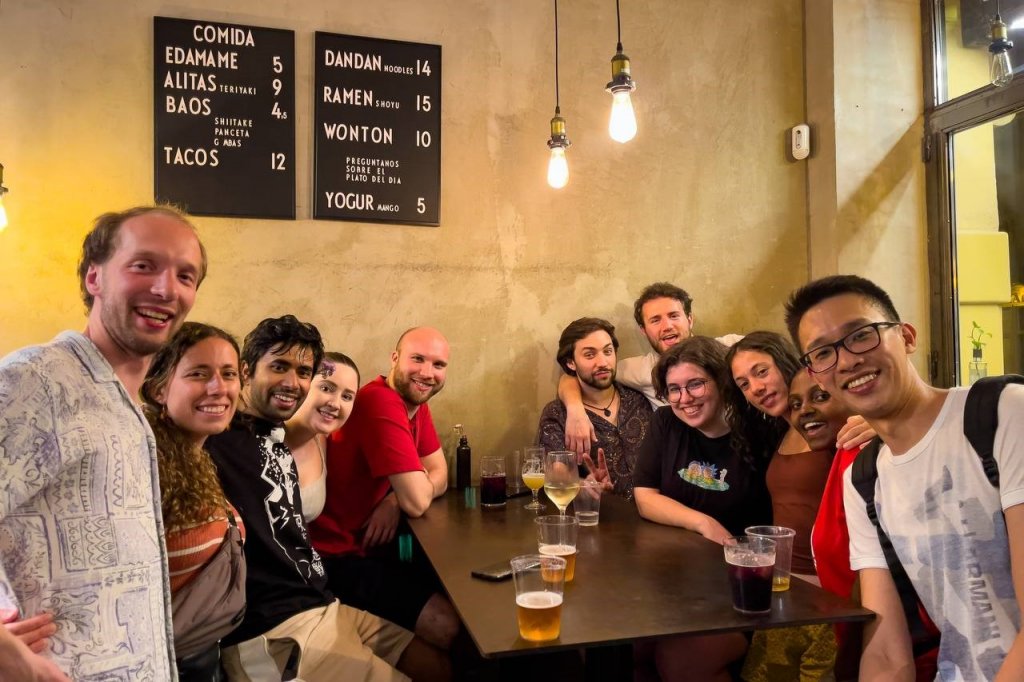

BiD4BESt – Network Training Event 5th – 9th June 2023, Donostia International Physics Centre DIPC, San Sebastian, Spain
The BiD4BESt Innovative Training Network event hosted its 3rd very successful week long in-person network training experience, 5th– 9th June, and was kindly hosted by our consortium host PI, Dr Silvia Bonoli, at the very beautiful location of Donostia International Physics Centre, Spain
Silvia welcomed the Early-Stage Researchers and Principal Investigators to the DIPC, followed by a welcome from the BiD4BESt Project Coordinator, Francesco Shankar, Physics & Astronomy Department, Faculty of Engineering and Physical Sciences, University of Southampton, UK. Our 13 Early- Stage Researchers are registered at prestigious institutions in the UK and across Europe, with attendees coming from Italy, Spain, Canary Islands, Greece, UK, and Germany, so a global partnership and a wonderful collaborative event.

Prof. Francesco Shankar (SOTON), Ivan Munoz Rodriguez (NOA)
Front Row L-R: Alba Vega Alonso Tetilla (SOTON), Giovanna Speranza (IAC), Blessing Musiimenta (UNIBO),
Mathilda Avirett-MacKenzie (UBATH), Dr Silvia Bonoli (DIPC), Luca Sala (LMU), Nischal Acharya (DIPC)
Participants
Early-Stage Researchers
Carolina Andonie (UDUR), Brivael Laloux (NOA), Blessing Musiimenta (UNIBO), Giovanna Speranza (IAC), Mathilda Avirett-MacKenzie (UBATH), Ivan Munoz Rodriguez (NOA), Ivan Lopez (UNIBO), Nischal Acharya (DIPC), Alexander Sicilia (SISSA), Evgenii Chaikin (ULEI), Alba Vega Alonso Tetilla (SOTON), Hao Fu (SOTON), Luca Sala (LMU).
Principle Investigators
Prof. Francesco Shankar, Project Coordinator, University of Southampton, UK (SOTON), Prof. Marcella Brusa, Alma Mater Studiorum Universita di Bologna, Italy (UNIBO), Dr Antonis Georgakakis, Institute for Astronomy, Astrophysics, Space Applications and Remote Sensing, National Observatory of Athens, Greece (NOA), Dr Klaus Dolag, Ludwig Maximilians University, Germany (LMU), Prof. Andrea Lapi – Scuola Internazionale Superiore di Studi Avanzati (SISSA), Italy (SISSA), Dr Carolin Villforth University of Bath, UK (UBATH), Dr Silvia Bonoli – Donostia International Physics Centre, Spain, (DIPC), Dr Cristina Ramos Almeida, Instituto de Astrofisica de Canarias, Spain (IAC), Prof. David Alexander, University of Durham, UK (UDUR), Prof. Joop Schaye, Leiden Observatory, The Netherlands (ULEI)
Day 1 & 2. The week started off with each Work Package group updating the network on progress and results. The Work Package leads gave an introduction and overview of their WP and its directional output. Following on, each ESR shared their research and results in response to their Work Package objectives. These sessions included lively discussions and thought-provoking ideas and strategies.
WP1 – Infancy, “The early black hole growth in highly starforming, dust-enshrouded galaxies (Dave Alexander – lead),Carolina Andonie (UDUR); Brivael Laloux (NOA) and Alex Sicilia (SISSA)
WP 2 – Adolescence, “Feedback and Outflows: The effects of AGN on their host galaxies” (Marcella Brusa – lead),Blessing Musiimenta (UNIBO); Giovanna Speranza (IAC); and Evgenii Chaikin (ULEI)
WP3 -Adulthood, “Galaxy properties and AGN” (Carolin Villforth & Silvia Bonoli – joint leads), Mathilda Avirett-Mackenzie (UBATH); Ivan Muñoz Rodríguez (NOA); Ivan E. Lόpez (UNIBO); and Nischal Acharya (DIPC)
WP4 – “Bridging theoretical modules to key observables” (Klaus Dolag – lead), Alba V. Alonso Tetilla (SOTON); Hao Fu (SOTON); Luca Sala (LMU)
ESR Forum: self-organised and independent where ESRs have an open discussion space.
Principal Investigator in-person meeting: Finally, to close Day 1 the PI’s held a meeting to discuss the status of the project and the strategies to move it to its conclusion.
Day 2
Via ESR feedback, the Brainstorming session at the Bologna network training event (Nov 2022) was an amazing success and so it was bought back for this training event. For this session we were then delighted to welcome prominent academics in the field of AGNs: Prof Francisco J. Carrera (IFCA, Spain) Director of the Athena Community office. University of Cantabria and researcher in the Galaxies and AGNs group at the Institute of Physics of Cantabria (IFCA, CSIC-UC), and Dr George Mountrichas (IFCA, Spain), Postdoctoral Researcher at Instituto de Física de Cantabria (IFCA). George has extensive experience in AGN-Galaxy connection from X-ray/optical data.
During the session, we first enjoyed an excellent review by Prof. David Alexander on the major advances in the field in the last ten years, and then Prof. Carrera discussed future prospects with new X-ray instruments. The two interventions sparked a lot of interest and discussion and generated thought-provoking ideas and strategies.
In the evening the group were treated to a delicious social dinner at the Sidrería Beharri restaurant where participants could try the typical local cuisine. A lovely way to relax after the first two busy days of the training week.
Day 3, 4 & 5 were dedicated to Early-Stage Researcher training sessions and centred mostly around preparing the ESRs for their ‘next steps’ in either academia or industry. The majority of the ESRs should be completing their Marie Skłodowska-Curie (European Union’s Horizon 2020 research and innovation programme BiD4BESt) in the coming months. Therefore, it is crucial to coach the students in the skills and tools in preparation of applying to academic or industrial positions in the near future.

The training started with an active round table organised and facilitated by Dr Silvia Bonoli and was ably supported by the network’s Principal Investigators, who themselves hold a vast wealth of personal experience in this sphere. The PI’s offered knowledgeable guidance, mentoring and coaching on the academic next steps.
The session included presentations and discussions on items such as:
- Writing an academic presentation letter
- Preparing applications for an academic position
- Writing a good academic Curriculum Vitae
- Managing interviews
- Presenting yourself

This ‘next steps’ theme was carried forward with 2 x 2-hour training sessions on the essential soft skills for jobs in Life Sciences, facilitated by the Skills4Science coaching company. Their training outlook is to incorporate humour and real-life examples to make their training engaging and effective. This session concentrated on applying for industrial positions and how to shine.
Topics covered were:
- Identifying career paths
- Values, interests, and skills
- Transferable skills:
- What I have acquired
- What is industry looking for
- Job offers in industry for PhD students
The ESRs were asked to prepare a draft of their industrial Curriculum Vitae which would be reviewed during one of the 2 sessions and looked to give top tips on improving what is sent out to potential employers.

The ESRs also had 2 afternoon sessions with the local Astronomy Outreach professional Valentina Rodríguez. Ms. Rodriguez is part of the team responsible for the dissemination of the scientific knowledge generated by DIPC researchers, as well as the promotion of public engagement in science through a wide range of outreach projects.
The sessions concentrated on how to turn your work into an effective story and covered the topics:
- Summarising work
- Audiences: Adapt your “story”
- Creating a convincing case
- The importance of one’s work
Here the ESRs were asked to prepare two short pieces of text, max 300 words, on the following
- How would you describe your field of science and the research that you carry out?
- In your opinion, what is the important of your research for this field of science and for society at large?
During the session, they also participated in a “role play”, where they had to prepare a short presentation to create a convincing case to present to a fictional committee to obtain research funds.

To wrap up the week the student engaged in a training session with SIMUNE ATOMISTICS on ‘Documenting scientific codes and tutorial creation’ , covering the following topics:
- The tools we use when documenting our software (mainly latex & GitLab)
- Examples of code documentation
- Coordination, workflow for writing documentation and reviewing
The training session followed a presentation format, with dedicated time for questions and discussions between the different sections of the presentation. By the end of the session, students gained an overview of the different types of documentation commonly used in scientific code development. Additionally, they will have learned the various tools available for effective documentation.
It was great to see the dedication and progress of the network in their research work and how important that we are equipping the ESRs with great knowledge and transferable soft skills. A very rewarding collaboration of science and the growth of BiD4BESt

Time for the ESRs to have some down time in their busy week. Cheers!
The network would like to thank the host, Dr Silvia Bonoli, Donostia International Physics Centre, DIPC for the energy and organisation that went into making this a successful event.

This project has received funding from the European Union’s Horizon 2020 research and innovation programme under the Marie Skłodowska-Curie grant agreement No 860744

